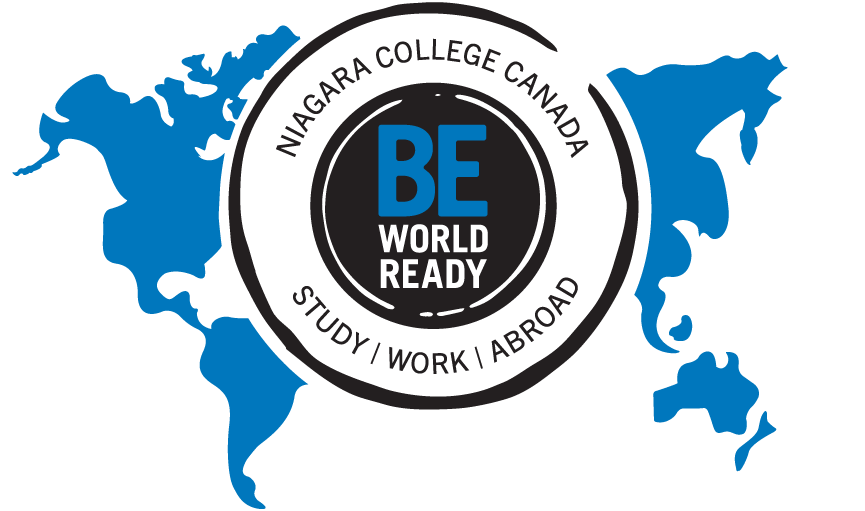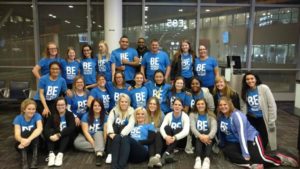An International Field Study trip to Amsterdam during mid-term break proved to be an inspirational and moving experience for many students who participated.
“The International Field Study trip to Amsterdam was an experience of a lifetime and definitely impacts my worldview,” said Lana Birnie-Reid, who is in term four of NC’s Recreation Therapy program. “I had never been that far away from home before. Traveling to Amsterdam and seeing first-hand the cultural differences, I found (it) shocking.”
In the IFS trip partially sponsored through Be World Ready program, 26 NC School of Community Services students traveled to Amsterdam, Netherlands, from October 20 to 25.
“I am a mature student who had reservations about going to college, but being at NC in the Recreation Therapy program has changed my life,” said Birnie-Reid. “So, while away, I got tattooed with #MyNCStory Amsterdam on my forearm; this represents my story at Niagara College and traveling abroad and how impactful it has been on me.”
Birnie-Reid was one of 11 students who felt so moved by the experience, they received tattoos with either a symbol of the IFS trip or of BWR Niagara College, connecting themselves permanently to the experience and those they shared it with.
The international learning experience focused on youth and aging in the Netherlands as well as social care and mental health. Students also learned from the Netherland’s advanced approach on the medicinal uses of cannabis and the public and private systems and practices in place that service the community. Trip highlights also entailed visits to the Anne Frank House, the Van Gogh Museum, the Snoezelen Room, and a day spent in Hogeweyk Dementia Village.
“The experience helped validate my person-centred thinking beliefs and it inspired me to think about ways that we could possibly bring those ways to our Niagara region,” said School of Community Studies professor, Mary-Christine Vanscoy, who was one of the two IFS Amsterdam trip leads. “We should all treat people no matter what stage in life, what illness, what disability they have etc. as equals and as such create better care systems to reflect the way we would want to be treated.”
Vanscoy reflected on how Hogeweyks Dementia Village has the same funding as any government funded institution and yet, takes a different approach by creating homes and a village that provide individuals more freedom than spending their finals days in a hospital. She expressed that individuals who live in Hogeweyks Dementia Village live happier, healthier and longer lives.
Chris Allan, a first-year social service worker student, echoed similar sentiments to Vanscoy and shared that his most memorable moment was attending Hogeweyks Dementia Village. He reflected upon listening to co-founder Yvonne Van Amerongen speak about her passion for helping those with dementia.
“She spoke of how with just a vision and no money they were able to forge ahead and design and develop one of the most amazing facilities that allow these residents to live their lifestyle as comfortable as possible with no rules, no nurses in uniforms around,” said Allan. “Just people in a community just like when they were at their own homes.”
“Yvonne made a statement that I will always remember, ‘more money doesn’t make you more creative,” shared Allan. He described how Van Amerongen and her two other co-founders, with little to no money, turned their idea into what is now a global model reshaping perspectives on the lifestyle and independence of someone living with dementia.
The lessons learned abroad are integrated in NC’s classrooms in Canada through the mindset of the students as well as the IFS trip leads. Christine Wilkinson, professor in the School of Community Studies and IFS Amsterdam trip lead, felt the trip had a strong connection to her Recreation Therapy curriculum and has already planned how she will incorporate some of her experiences in Amsterdam into upcoming courses she will be delivering. Wilkson also highlighted how the trip allowed her to engage with students from other programs and allowed her to learn more about their areas of study and their aspirations.
“It was very rewarding watching students who didn’t know each other come together through their shared experiences,” said Wilkinson. She also noted being thankful for the opportunity to co-lead the trip with Vanscoy; “She and I teach in different programs, and did not know each other well before this trip, but I think we made a great team due to our different backgrounds, but similar approaches towards this experience.”
The Be World Ready program continuously strives to create world-ready and work-ready graduates. Offering culturally diverse learning environments, the program aims to give NC students the competitive edge to launch their careers and also develop global competencies through an international experience.
“I believe that participating in an IFS trip not only provides a great opportunity educationally, but also the ability to learn about a completely different culture,” shared Allan. “I would without a doubt recommend an IFS trip to every single student that wanted to expand their minds, and experience something truly special.”
Gaining gobal competencies
IFS trips are a key way students have the opportunity to become further culturally and globally engaged, and deepen intercultural competencies and awareness. For Child and Youth Care student Daniel Gutierrez-Azcarate, the most memorable aspect about travelling is adjusting to cultures and understanding them from a hands-on perspective.
“I was inspired to go on this trip because it seemed like an incredible once-in-a-lifetime opportunity for me to travel the world and learn about cultures on a first hand basis,” said Gutierrez-Azcarate. “As a visually impaired student, I don’t have much access to independence as most students, but I got to grasp that as I was half way across the globe from home. It was incredible.”
Loving art, the Van Gogh museum was one of the most memorable moments on the trip for Gutierrez-Azcarate as he was able to participate in a painting session at a museum dedicated to one of his idols. He commented how the museum had paintings that had texture for the visually impaired to touch.
“I am also a member of the LGBTQ+ community, and the amount of pride flags I saw there was shocking and inclusive,” said Gutierrez-Azcarate. “It impacted me because I feel as though a lot of countries can learn from that perspective. The rest of the world can learn to be accepting to the LGBTQ+ community from both Canada and Netherlands.”
Gutierrez-Azcarate accredited the success of his experiences in Amsterdam to the guidance and support of his faculty leads, classmates, tour guide and bus driver; “As as a visually impaired student, I felt very much included within every activity since they assured that the tour guides were descriptive so I could have a better understanding on the environment around me,” he said.
Noting the different textures beneath his feet, the curves and uneven grounds of the Amsterdam’s streets, Gutierrez-Azcarate said it would have been very easy for him to trip if not for the assistance of group members. He noted how it caused him to reflect on how advanced Canada is in terms of its accessibility. IFS trips also present the lens for students to gain a better perspective of Canada and learning more about their home country.
His classmate, Allen, who assisted Gutierrez-Azcarate throughout the trip, echoed similar thoughts. “In Canada, there is an accessible entrance at nearly every building; however, when in Amsterdam, accessibility for those who need it really doesn’t exist,” said Allen, a first-year Social Service Worker student. “Most buildings have no elevators, no wheelchair entrances, or door openers. I believe they could certainly learn from our model on this aspect.”
Allan also believes that Canadians can also learn from the society he witnessed in Amsterdam as well, commenting on how the roads are more accessible due to the limited number of cars used. “There are bicycle parking garages because the primary mode of transportation is bike, he said. “Bicycles always have the right of way over cars as well as humans.”
Developing a deeper understanding of differentiating cultures, backgrounds and perspectives allows students to gain a more holistic awareness of themselves and the world they live in. Through experiencing the world, students are able to witness first-hand how issues, challenges and differences affecting people globally are addressed, and how they themselves can become responsive players by developing a more diverse knowledge skill set. Students are able to become more culturally and globally engaged as they develop the knowledge and understanding of varying perspectives.
“We should all travel elsewhere and have that sense of knowledge that not everywhere will be the same,” said Gutierrez-Azcarate.
For more information on upcoming IFS trips and the Be World Ready program, please visit beworldready.ca.


